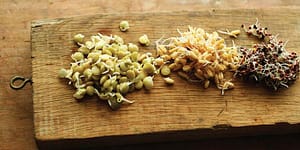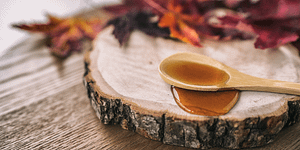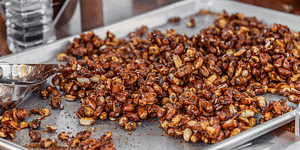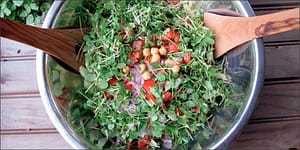Dried Apples: Two Ways to Enjoy All Year Long

Autumn is undeniably apple season, but how do you take your apples after you can’t get them straight from the tree? Instead of buying mealy apples from your grocery store, try drying your fresh apples and enjoying them later!
The following is an excerpt from Preserving Food Without Freezing or Canning by The Gardeners & Farmers of Terre Vivante. It has been adapted for the web.
String-Dried Apples
Variation 1:
Materials
- Apples
- A peeler and corer Butcher’s string Radiator
- A clean cloth
- Plastic or cloth bags, or tin cans
Peel whole apples at the end of winter, when they begin to wrinkle. Core and slice them into 1⁄4-inch rounds. Thread the rounds onto sturdy string (such as butcher’s string), and shape the strings into 1⁄2-pound necklaces, which are to be hung above one or more radiators. If the radiator is located under a window, several necklaces can be hung from the window hardware. If the radiator is only lukewarm, you can start the drying process by placing the necklaces on a clean cloth set directly on it. Depending on the radiator temperature, it can take anywhere from four to six days for the fruit to dry. At the end of the drying process the rounds will have shrunk by half, but will feel flexible. It is best to start tasting them after the fourth day. Store them in plastic bags that you’ve sealed after letting out all the air; put them away or hang them in a dry, cool place. The apples will keep for one year. Tin cans or cloth bags certainly would be equally suitable.
Ruth Goldstein, Canteleu
Variation 2: Apples Dried with Elderflowers

- Pippin-type apples
- A peeler and corer String
- Stove or boiler
- Tin can or wooden box
- A handful of dried elderflowers (from the previous summer)
Core the apples and slice them into 1⁄4-inch rounds. Thread them on a string, through the center hole, and dry them over the stove or a central heating boiler until they become flexible. Seal them in a tin can or a wooden box, along with a handful of dried elderflowers. The apples will take on a delicious taste of pineapple, and keep indefinitely.
Pascale Dey-Marquis, Montigny-en-Gohelle
Andrée Motsh, Amierle
Recommended Reads
Recent Articles
What’s so great about oyster mushrooms? First, you can add them to the list of foods that can be grown indoors! They are tasty, easy to grow, multiply fast, and they love a variety of substrates, making oyster mushrooms the premium choice. The following is an excerpt from Fresh Food from Small Spaces by R. J.…
Read MoreCraving something sweet? These delicious maple roasted nuts are the perfect treat to help you push through those end-of-winter blues. The following is an excerpt from Full Moon Feast by Jessica Prentice. It has been adapted for the web. The Magic of Maple: A Rich History Following the Hunger Moon, just before the first thaw…
Read MoreDoes the cold weather have you dreaming about fresh greens and colorful salad? Grow and harvest sprouts indoors to make those dreams a reality! Follow this quick start guide to year-round greens for fresh salad greens in just a couple of weeks! The following is an excerpt from Year-Round Indoor Salad Gardening by Peter Burke. It…
Read More









